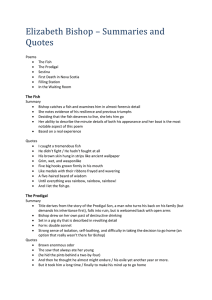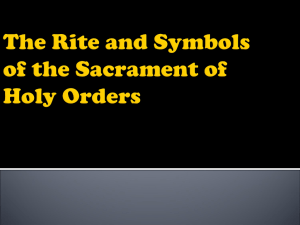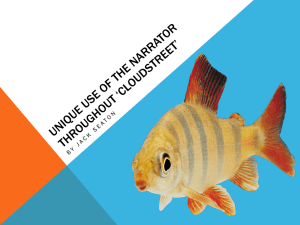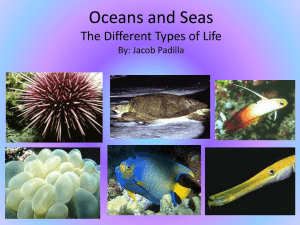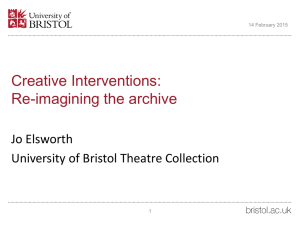Elizabeth Bishop
advertisement
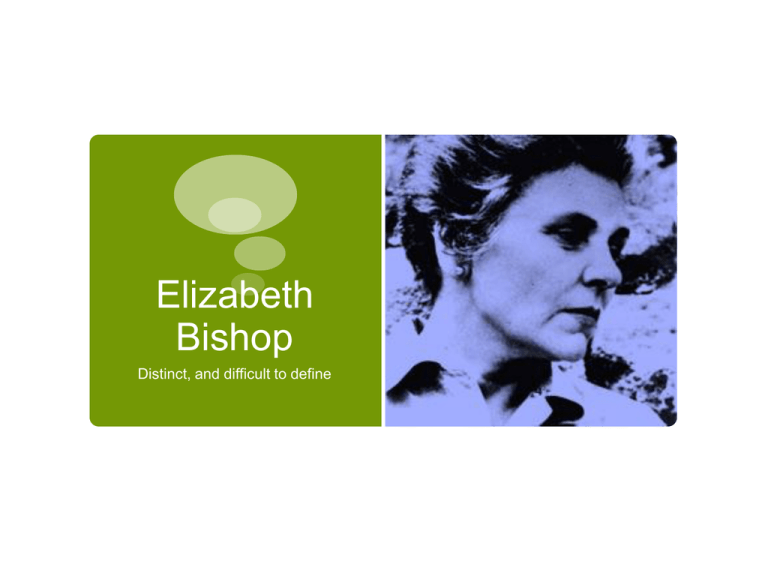
Elizabeth Bishop Distinct, and difficult to define Main Themes In ‘The Fish’, ‘Filling Station’, ‘The Prodigal’ and ‘Questions of Travel’ Often present in her poems, in many form (a fish, pigs, a sunrise, a Brazilian mountain range) Nature is powerful, redemptive, inspirational, sustaining. Quotes… “I caught a tremendous fish” Nature “The sunrise glazed the barnyard mud with red” “For if those streaks, those mile-long, shiny, tearstains, aren’t waterfalls yet” Questions of Travel The Fish The Prodigal “Not to have seen them gesturing like noble pantomimists, robed in pink” “Light-lashed, self-righteous…” Quotes… “I stared and stared And victory filled up The little rented boat” Human Spirit “till, sickening, he leaned to scratch her head” “he almost thought he might endure his exile yet another year or more” “Somebody embroidered the doily” “Somebody loves us all” The Fish The Prodigal Filling Station Bishop deals with the resilience or the strength of the human spirit in a number of poems – ‘The Fish’ is as much about this as it is a description of a fish; the prodigal son endures his exile; the mother in the filling station adds delicate touches to the home Travel and thoughts of home, or domestic life, are often evident in her work: in ‘Questions’, travelling is as much about our inability to be at home in new cultures as it is about the delights of travel; the Prodigal knows he must return some day; the motherly touches in the filling station surprise and reassure Bishop. Quotes… “Should we have stayed at home, wherever that may be?” Travel/Home Questions of Travel The Prodigal “Why the extraneous plant? Why the doily? Why, oh why, the doily?” Filling Station “But it took him a long time Finally to make his mind up to go home” Alcoholism Bishop’s own experience informs the prodigal’s motivation for staying. She shares her insight with us through his character. People/History/Unders tanding More than any traditional theme, Bishop attempts to understand the subjects of her poetry: their nature, their condition, their culture, their history Style Look, Relate, Describe, Think, Rainbow! • Observation – probing – meditation – revelation/insight/epiphany: see ‘The Fish’ and ‘Filling Station’ • Pays attention to the insignificant, making it relevant: see all of them! • Finds truth, beauty and meaning in the unexpected and insignificant: big ugly fish anyone? Or noisy wooden clogs? • Insightful on a public, universal level: ‘Somebody loves us all’ • Honest and aware in relation to her self: ‘He hid the pints behind a two-byfour) • Personal experience informs her work much more than spiritual, metaphysical, political or intellectual influence, yet her contemplation of her experience leads her to greater insight (rainbow!) • Attention to detail • Subjective descriptions – see domestic imagery in ‘The Fish’ • Deliberately off-hand, casual tone • Often humorous or whimsical, ironic: ‘or oils it, maybe’ • Masterful control of meter: double sonnets, for example • Subtle use of sound effects (alliteration, sibilance, cacophony) The question: ‘Bishop’s patience, eye for detail and inquisitive mind lead her to find substance and universal truth in the unexpected and the personal.’ Write your response to this statement, with reference.... Detailed description Colours, textures, patterns Similes are subjective, domestic The Fish Patient study allows her to see five hooks Her catch has its own victory Bishop feels a kinship with the fish, a connection, respect and a sense of harmony which leads her to let it go in a moment of epiphany. Persona initially disgusted but patience allows domestic to appear Filling Station Evidence of family life: ‘a dirty dog, quite comfy’; ‘some comic books’ Domesticity: doily etc is evidence of mother Questioning the scene, Bishop realises the mother figure is not only domestic, she is a creative soul. In spite of the squalor of her home she attempts to add elegance and order to the filling station The non-specific ‘somebody’ along with the use of ‘us’ in the final line elevates Bishop’s observations to the universal. Whether in a spiritual sense or on a human level, be it God or a mother, “somebody loves us all.” The personal: Underlying psychology of the poem comes from Bishop’s own alcoholism The Prodigal The opening shows no sign of beauty, but Bishop finds it The alcoholic wishes to remain Affection Redemptive power of nature ‘The sunrise’ Spirituality The universal need for companionship Bishop follows in a long tradition of artists depicting this Biblical story, but she uniquely focuses on the squalor and the alcoholic’s desire to remain in his self-imposed, dehumanising exile. However, she colours the story with a sunrise, the warmth of home, and an undeniable sense of the spiritual. Patient observation of Brazilian landscape Questions of Travel Imagines turning to rivers and waterfalls before her eyes
